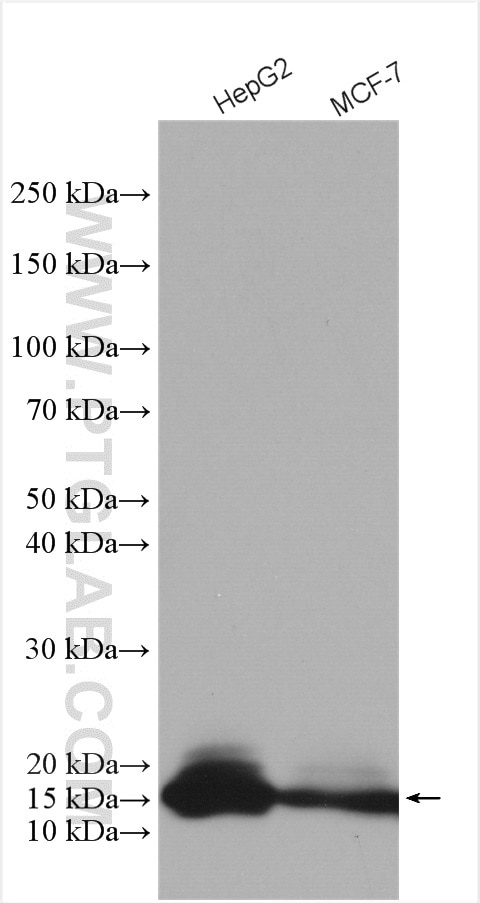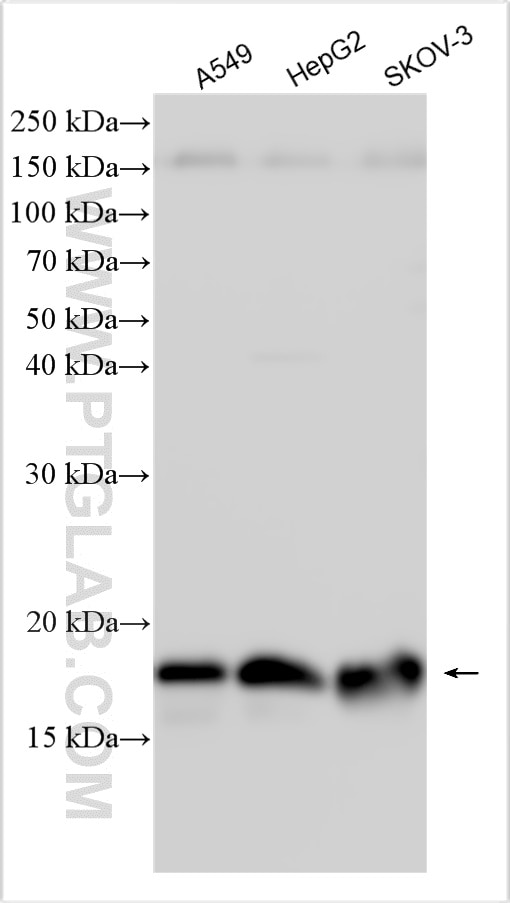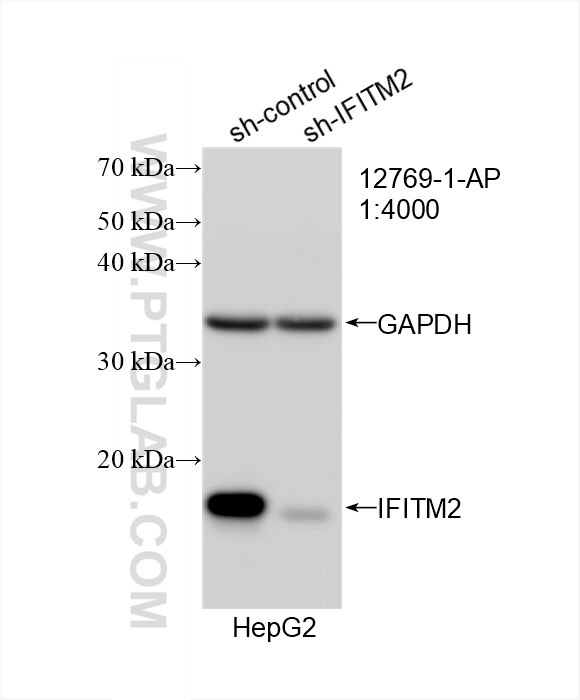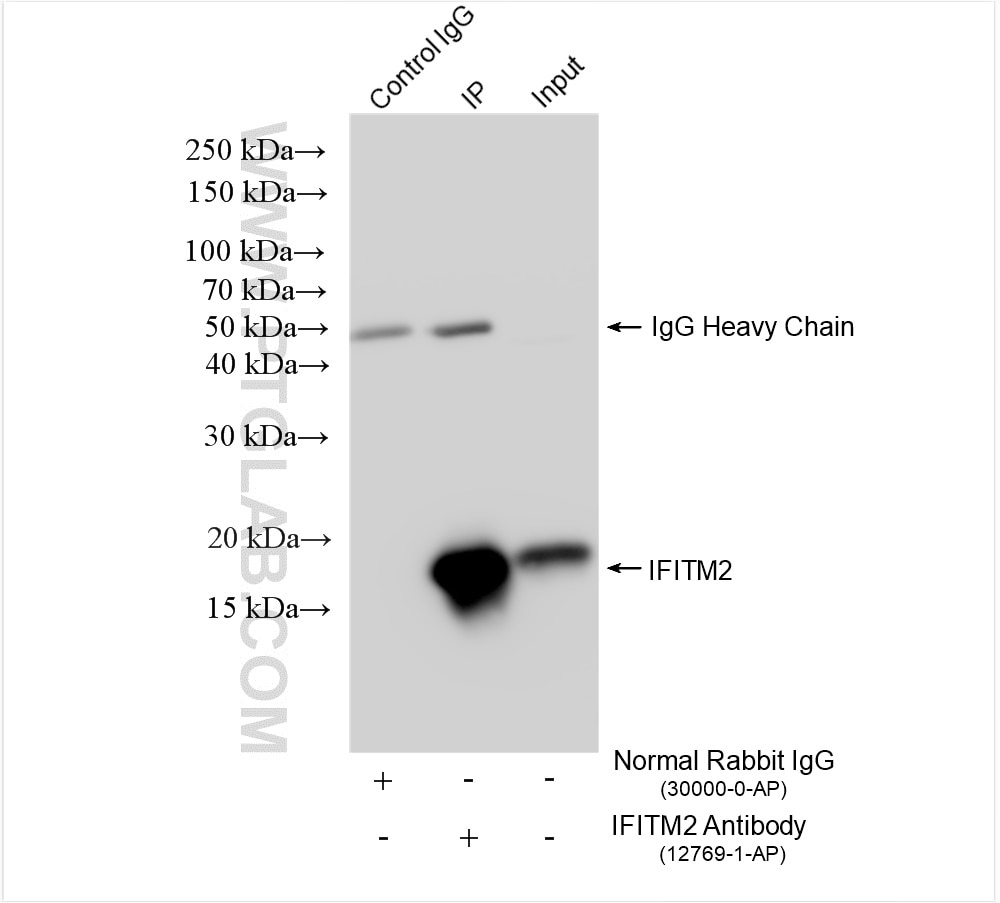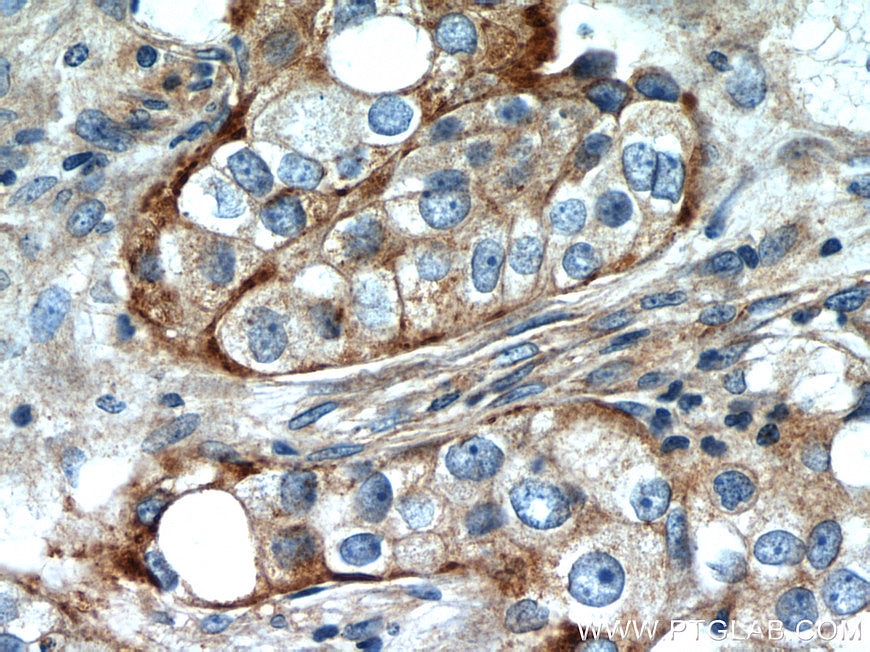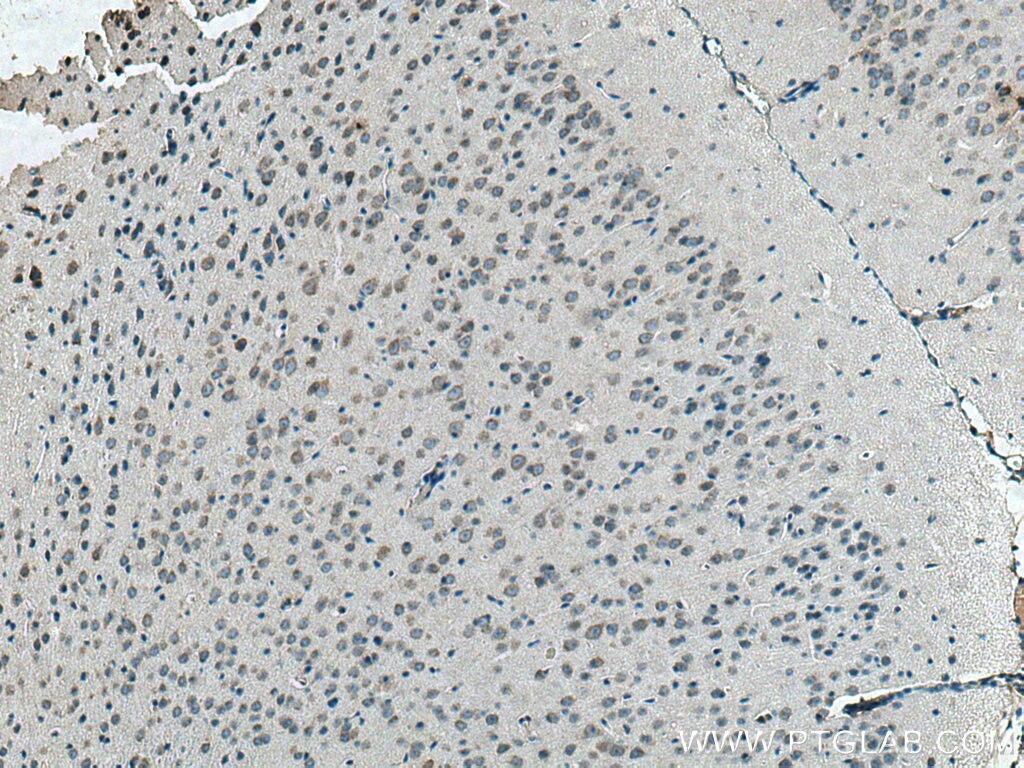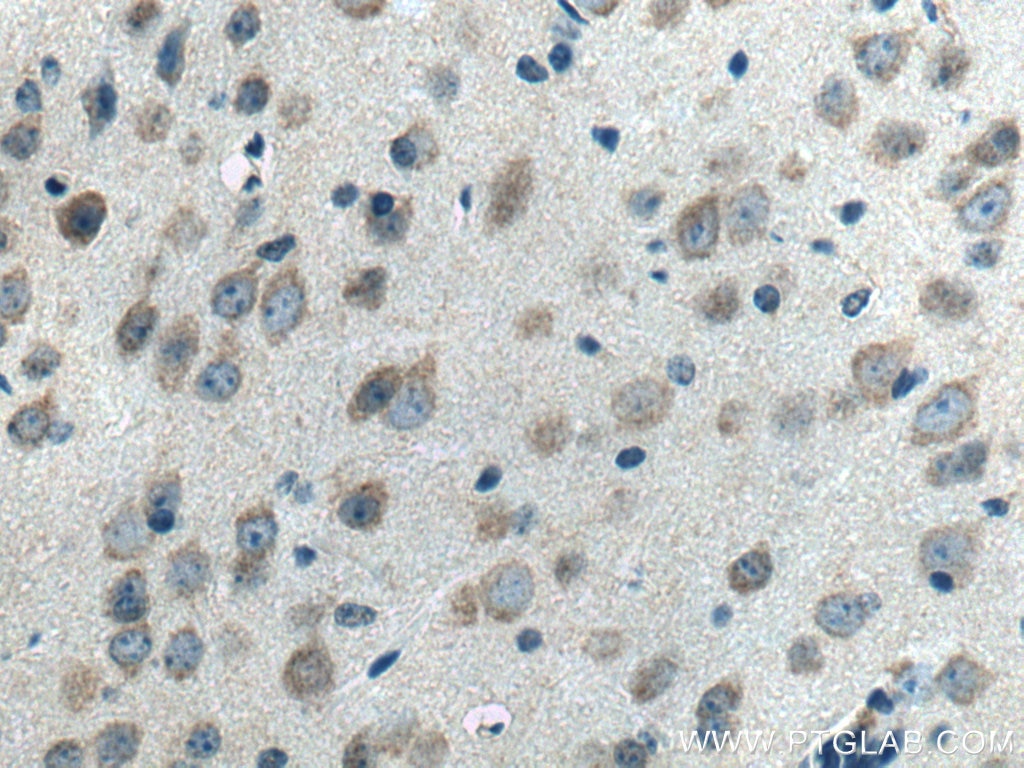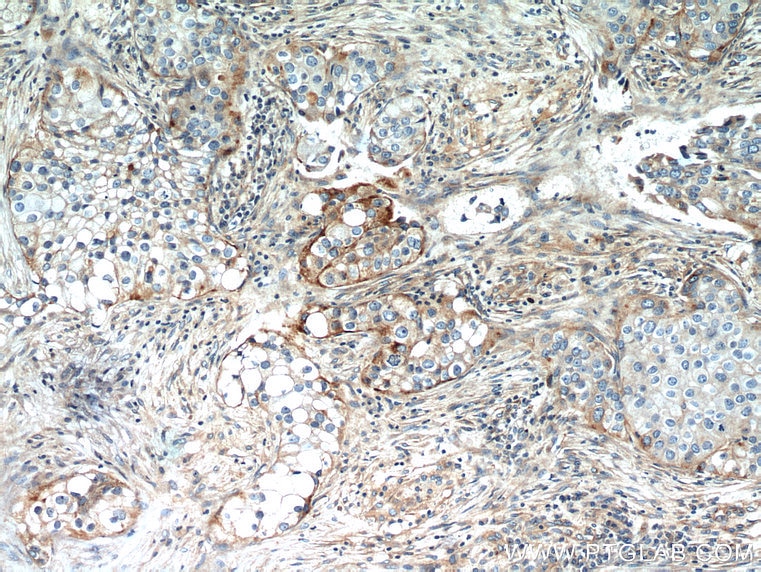Validation Data Gallery
Tested Applications
| Positive WB detected in | A549 cells, HepG2 cells, SKOV-3 cells, MCF-7 cells |
| Positive IP detected in | HepG2 cells |
| Positive IHC detected in | human breast cancer tissue, mouse brain tissue Note: suggested antigen retrieval with TE buffer pH 9.0; (*) Alternatively, antigen retrieval may be performed with citrate buffer pH 6.0 |
| Positive IF/ICC detected in | HeLa cells |
Recommended dilution
| Application | Dilution |
|---|---|
| Western Blot (WB) | WB : 1:2000-1:10000 |
| Immunoprecipitation (IP) | IP : 0.5-4.0 ug for 1.0-3.0 mg of total protein lysate |
| Immunohistochemistry (IHC) | IHC : 1:20-1:200 |
| Immunofluorescence (IF)/ICC | IF/ICC : 1:250-1:1000 |
| It is recommended that this reagent should be titrated in each testing system to obtain optimal results. | |
| Sample-dependent, Check data in validation data gallery. | |
Published Applications
| KD/KO | See 12 publications below |
| WB | See 36 publications below |
| IHC | See 1 publications below |
| IF | See 9 publications below |
| IP | See 1 publications below |
| FC | See 1 publications below |
Product Information
12769-1-AP targets IFITM2 in WB, IHC, IF/ICC, IP, ELISA applications and shows reactivity with human, mouse samples.
| Tested Reactivity | human, mouse |
| Cited Reactivity | human, mouse, pig |
| Host / Isotype | Rabbit / IgG |
| Class | Polyclonal |
| Type | Antibody |
| Immunogen |
CatNo: Ag3451 Product name: Recombinant human IFITM2 protein Source: e coli.-derived, PGEX-4T Tag: GST Domain: 1-132 aa of BC009696 Sequence: MNHIVQTFSPVNSGQPPNYEMLKEEQEVAMLGAPHNPAPPTSTVIHIRSETSVPDHVVWSLFNTLFMNTCCLGFIAFAYSVKSRDRKMVGDVTGAQAYASTAKCLNIWALILGIFMTILLVIIPVLVVQAQR 相同性解析による交差性が予測される生物種 |
| Full Name | interferon induced transmembrane protein 2 (1-8D) |
| Calculated molecular weight | 132 aa, 15 kDa |
| Observed molecular weight | 15-17 kDa |
| GenBank accession number | BC009696 |
| Gene Symbol | IFITM2 |
| Gene ID (NCBI) | 10581 |
| RRID | AB_2122089 |
| Conjugate | Unconjugated |
| Form | |
| Form | Liquid |
| Purification Method | Antigen affinity purification |
| UNIPROT ID | Q01629 |
| Storage Buffer | PBS with 0.02% sodium azide and 50% glycerol{{ptg:BufferTemp}}7.3 |
| Storage Conditions | Store at -20°C. Stable for one year after shipment. Aliquoting is unnecessary for -20oC storage. |
Background Information
IFITM2, also named as 1-8D, belongs to the CD225 family. It is an IFN-induced antiviral protein that mediates cellular innate immunity to at least three major human pathogens, namely influenza A H1N1 virus, West Nile virus (WNV), and dengue virus , by inhibiting the early steps of replication. IFITM2 induces cell cycle arrest and mediates apoptosis by caspase activation and in p53-independent manner. It is overexpressed in colon carcinoma. IFITM2 is a novel pro-apoptotic gene that will provide new insights into the regulated cellular pathways to death. IFITM proteins are recently identified as viral restriction factors that inhibit infection mediated by the influenza A virus (IAV) hemagglutinin (HA) protein. Also they serve as important components of the innate immune system to restrict HIV-1 infection. Catalog#12769-1-AP is a rabbit polyclonal antibody produced with full-length of human IFITM2.
Protocols
| Product Specific Protocols | |
|---|---|
| IF protocol for IFITM2 antibody 12769-1-AP | Download protocol |
| IHC protocol for IFITM2 antibody 12769-1-AP | Download protocol |
| IP protocol for IFITM2 antibody 12769-1-AP | Download protocol |
| WB protocol for IFITM2 antibody 12769-1-AP | Download protocol |
| Standard Protocols | |
|---|---|
| Click here to view our Standard Protocols |
Publications
| Species | Application | Title |
|---|---|---|
Cell The IFITM proteins mediate cellular resistance to influenza A H1N1 virus, West Nile virus, and dengue virus. | ||
Cell Host Microbe Resistance of Transmitted Founder HIV-1 to IFITM-Mediated Restriction.
| ||
Adv Sci (Weinh) IFITM2 Modulates Endocytosis Maintaining Neural Stem Cells in Developing Neocortex | ||
Cell Host Microbe IFITM Proteins Incorporated into HIV-1 Virions Impair Viral Fusion and Spread.
| ||
Nat Commun IFITM3 restricts virus-induced inflammatory cytokine production by limiting Nogo-B mediated TLR responses |

